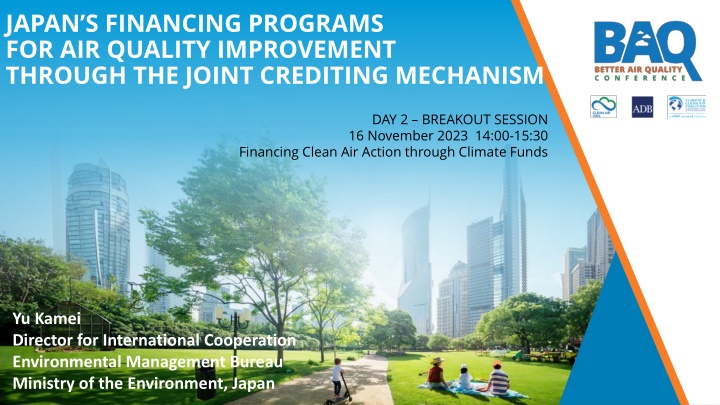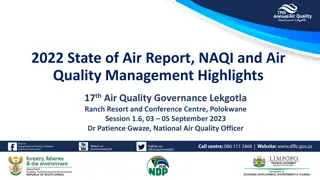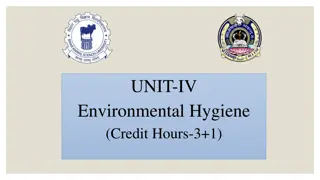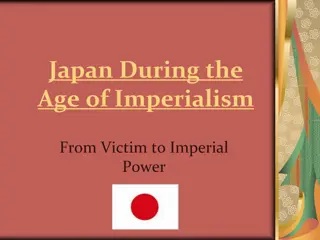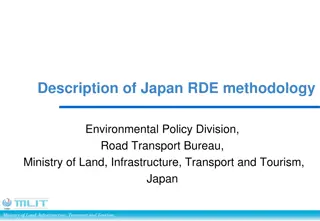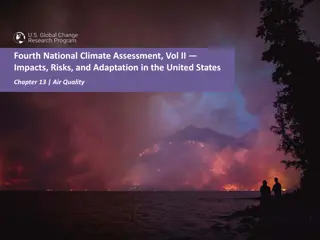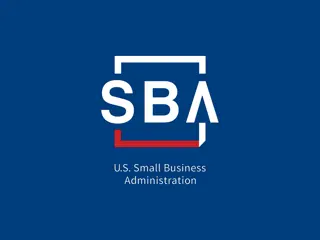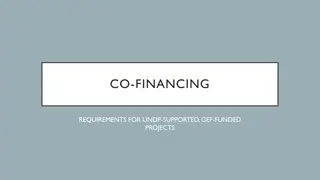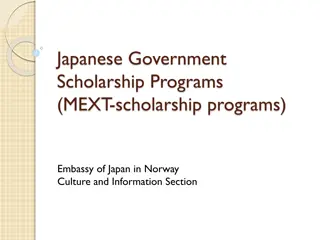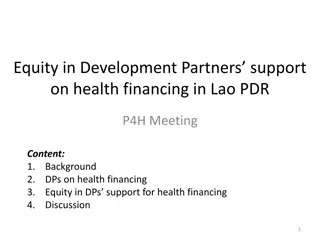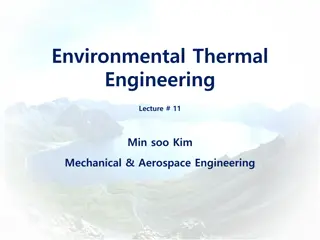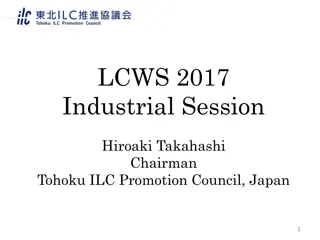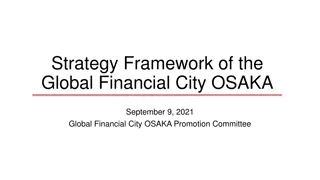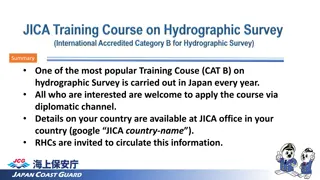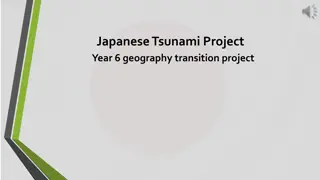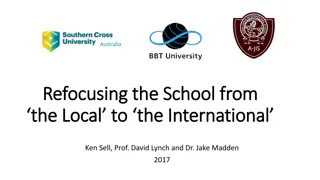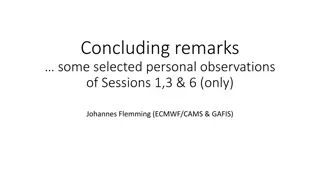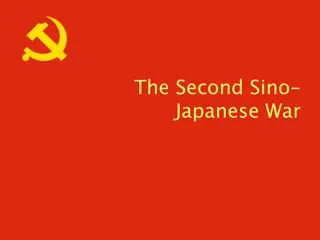Japan's Financing Programs for Air Quality Improvement
Japan's financing programs aim to improve air quality through the Joint Crediting Mechanism (JCM), facilitating the adoption of decarbonizing technologies and infrastructure for GHG emission reductions. The JCM promotes sustainable development in partner countries while aligning with the Paris Agreement's cooperative approaches. Through financial support and investments, Japan incentivizes the selection of advanced decarbonizing equipment and facilities, contributing to both countries' NDCs. Learn about the JCM's basic concepts, project development, and MRV operations to achieve emission reductions and sustainable air quality improvements.
Download Presentation

Please find below an Image/Link to download the presentation.
The content on the website is provided AS IS for your information and personal use only. It may not be sold, licensed, or shared on other websites without obtaining consent from the author.If you encounter any issues during the download, it is possible that the publisher has removed the file from their server.
You are allowed to download the files provided on this website for personal or commercial use, subject to the condition that they are used lawfully. All files are the property of their respective owners.
The content on the website is provided AS IS for your information and personal use only. It may not be sold, licensed, or shared on other websites without obtaining consent from the author.
E N D
Presentation Transcript
JAPANS FINANCING PROGRAMS FOR AIR QUALITY IMPROVEMENT THROUGH THE JOINT CREDITING MECHANISM DAY 2 BREAKOUT SESSION 16 November 2023 14:00-15:30 Financing Clean Air Action through Climate Funds Yu Kamei Director for International Cooperation Environmental Management Bureau Ministry of the Environment, Japan
JAPANs financing programs for air quality improvement Air Quality Improvement Climate Change Mitigation Co-benefits Approach Joint Crediting Mechanism - Finance Program for JCM Model Projects - Japan Fund for the JCM - ADB Trust Fund JCM Project Development - JCM Global Match - Japan Platform for Redesign: Sustainable Infrastructure - City to City Collaboration Program - Capacity Building Program - cooperation with relevant organizations (CAA, IGES, ACAP, ...)
Basic Concept of the Joint Crediting Mechanism (JCM) Facilitate diffusion of leading decarbonizing technologies and infrastructure, etc., through investment by Japanese entities, thereby contributing to GHG emission reductions or removals and sustainable development in partner countries. Contribute to the achievement of both countries NDCs while ensuring the avoidance of double counting through corresponding adjustments. Implement the JCM consistent with the guidance on cooperative approaches, referred to in Article 6, paragraph 2 of the Paris Agreement. UNFCCC, Article 6 of the Paris Agreement Reporting and Corresponding Adjustments JCM JAPAN Partner Country Leading decarbonizing technologies, etc., and implementation of mitigation actions JCM Projects Since 2013, Japan has established the JCM with 27 partner countries and over 230 projects have been selected. MRV* MRV* Operation and management by the Joint Committee which consists of representatives from the both sides Used to achieve Japan s NDC GHG emission reductions/removals JCM Credits *measurement, reporting and verification 3
Joint Crediting Mechanism - Contribution from Japan (example) Partner Country s government & entities Japanese government & entities Credits Incentivize selection of decarbonizing technologies, etc. by the financial support or the investment to the initial cost Emission reductions Japan will acquire a part of JCM credits (in return for the contribution of Japan, such as financial support or investment for projects*) Financial support GHG emissions The proportion of financial support depends on supporting schemes. Select Initial cost Initial cost emissions GHG Conventional equipment & facility Advanced decarbonizing equipment & facility 4
Finance Programme for JCM Model Projects by MOEJ Budget for projects starting from FY 2023 is approx. 15 billion JPY (approx. USD 109 million) in total by FY2025 Government of Japan Includes collaboration with projects supported by JICA and other governmental-affiliated financial institute. (1 USD = 137 JPY) Conduct MRV and expected to deliver JCM credits issued Finance part of an investment cost (up to half) International consortiums (which include Japanese entities) Scope of the financing: facilities, equipment, vehicles, etc. which reduce CO2 from fossil fuel combustion as well as construction cost for installing those facilities, etc. Eligible Projects: starting installation after financing is awarded and finishing installation within three years. 5
Examples of Projects supported by the JCM financing programs Renewable Energy Binary Power Generation Project at Geothermal Power Plant, MHI, Ltd., Philippines Hydro Power Plant, Toyo Energy Farm Co., Ltd., Indonesia Biomass Co-Generation System, Fuji-Foods Coporation, Thailand Floating Solar PV,TSB Co., Ltd.,Thailand Solar power, FARMLAND Co., Ltd., Chile Energy efficiency [Consumer sector] Energy efficiency [Industrial sector] Energy-saving of mobile communications base transceiver stations, KDDI Corp. Indonesia Optimization in petroleum refining plant, Yokogawa Electric Corp. Indonesia Energy saving at convenience stores, Panasonic, Indonesia High-efficiency air- conditioning system, Hitachi, Daikin, Vietnam High-efficiency refrigerator, Mayekawa MFG, Indonesia Energy efficiency [Urban sector] Waste Transport Amorphous transformers in power distribution, Hitachi Materials, Vietnam Power Generation with Methane Gas Recovery System, NTTDATA, Mexico CNG-Diesel Hybrid Public Bus, Hokusan Co., Ltd., Indonesia LED street lighting system with wireless network control, MinebeaMitsumi, Cambodia Waste to Energy Plant, JFE engineering, Myanmar 6
JCM Project Development To identify barriers and needs for JCM project development in partner countries in terms of technology, financing and partnership, and provide solutions for overcoming barriers through consultations. To enhance overall capacity for JCM implementation through facilitating understanding on the JCM rules & guidelines, and MRV methodologies by organizing workshops, seminars, training courses and site visits. JCM Business Matching Site JCM Global Match provides business matching opportunities for sellers and buyers of low and zero carbon technology for the JCM project. - Japan Platform for Redesign: Sustainable Infrastructure(JPRSI) - Capacity Building Program - cooperation with relevant organizations (CAA, IGES, ACAP, ...) - City to City Collaboration Program 7
City-to-City Collaboration Program Partnering 20 Japanese subnational governments with 49 subnational governments in 13 countries Pairing Japanese cities with partner cities abroad and promoting transfer of knowledge and experience for decarbonization in partnership with private solution providers. MOEJ Private partners - Financial support - Program management JCM Model Projects Formulated in the framework of City-to-City Collaboration Program - Survey and identification of local needs - Provide suitable technology solutions Japanese city Partner city Collaboration - Coordination with relevant stakeholders - Development/Implementation of climate actions - Knowledge transfer and sharing good practices - Advisory support on city administration Co-create low-carbon projects Support developing policies and plans to promote climate actions Build capacity for government staff Raise awareness of stakeholders 24projects in 7countries Deliver net zero commitment Deploy decarbonized technologies/infrastructure Develop action plans and regulations 8
For more information Please contact MOE Japan (E-mail) YU_KAMEI@env.go.jp YUMI_YASUDA@env.go.jp (URL) https://www.jcm.go.jp/ Thank you for your attention ! 9
